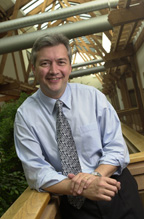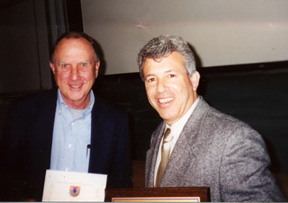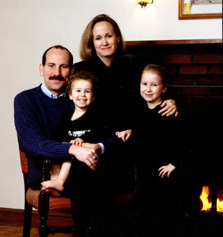Geotimes

Society Page
News
about people and
announcements
from
AGI's
39 member societies
______________________
Christina Reed |
To
post news in Society Page, send e-mail to geotimes@agiweb.org
with the subject: Society Page. |
Contents:
The call
of a lifetime
Christopher Chyba, an astrobiologist and science policy specialist
on international security, answered the phone at his home in the San Francisco
Bay area one morning, about six weeks after September 11. John Holdren,
a distinguished science policy professor at Harvard University, was on
the line. It was 7:30 a.m.
“I know John well enough to recognize his voice. He told me he had important
news,” Chyba says. “My first thoughts were: What’s happening? Why would
John be calling me?”
 Holdren told
Chyba the John D. and Catherine T. MacArthur Foundation had selected him
as a 2001 recipient. “It’s a tradition on the MacArthur board that members
who know the awardees have the honor of calling them,” Holdren says. The
MacArthur Foundation gives each fellow $500,000 over five years to do with
as they please — no strings attached.
Holdren told
Chyba the John D. and Catherine T. MacArthur Foundation had selected him
as a 2001 recipient. “It’s a tradition on the MacArthur board that members
who know the awardees have the honor of calling them,” Holdren says. The
MacArthur Foundation gives each fellow $500,000 over five years to do with
as they please — no strings attached.
A similar call went out to 22 other fellows who “provide the imagination
and fresh ideas that can improve people’s lives and bring about movement
on important issues,” says Jonathan Fanton, president of the MacArthur
Foundation.
MacArthur fellow Christopher
Chyba.
For Chyba that means: influencing public policy on nuclear nonproliferation,
modeling the conditions for life on other planets and early Earth; aiding
in designing a spacecraft to explore Jupiter’s moon Europa; and investigating
the impact of preparing for biological terrorism on public health. “I’m
working on the question of the re-aerosolization of anthrax spores,” he
says. “Once they fall down onto a table top, for example, how much breeze
is needed to put them back up into the air again? The behavior of windblown
dust is directly relevant to this question: I know about the latter from
work I did a dozen years ago looking at windblown dust on Neptune’s moon
Triton.”
The foundation praised Chyba as someone who is “dedicated to the idea
that scientists share a dual responsibility for enhancing our understanding
of the natural world and for participating in the public discourse that
affects our collective futures.”
Chyba began with a bachelor’s degree in physics from Swarthmore College
in Pennsylvania, then pursued theoretical physics at the University of
Cambridge in England for another bachelor’s degree, and continued on there
for a master’s in history and philosophy of science. He earned his doctorate
in astronomy in 1991 from Cornell University in Ithaca, N.Y. Shortly afterward,
Chyba received a White House fellowship and served on the national security
staff for two years.
Now at the SETI Institute and Stanford University, Chyba, 42, is the
co-director of Stanford’s Center for International Security and Cooperation
and is an associate professor (research) of geological and environmental
sciences. Chyba defines international security to broadly include global
environmental issues. “Climate change and coral reef die-off are in the
broadest sense security issues, because they affect human welfare.”
He is a member of the American Geophysical Union and holds the Carl
Sagan Chair for the Study of Life in the Universe at the SETI Institute
in Mountain View, Calif.
Chyba blends science and security issues with a simple philosophy. “Planetary
scientists and astronomers take part in exploring the answers to long-standing
questions. For example: the origin of life. And with respect to our own
solar system, whether other planets have life, we should know the answer
this century. We have wonderful opportunities, but all of that is not so
terribly important if civilization doesn’t face the challenges addressing
it.”
Accolades
for aquifer scientists
One of the most satisfying jobs Bill Wilson took on during his
45 years as a hydrogeologist was a seven-year stint working for an international
group of groundwater scientists on one of their biggest challenges: sharing
their research.
In 1994, Wilson started as the first managing editor of the Hydrogeology
Journal for the International Association of Hydrogeologists (IAH).
Wilson is a member of the IAH U.S. National Committee. During the IAH general
meeting in Munich last September, the society voted to give Wilson honorary
membership.
The society began in 1956 as “a worldwide forum on the management of
groundwater for the benefit of mankind and the environment.” Wilson’s efforts
to aid authors from developing and non-English-speaking countries in publishing
their peer-reviewed research in professional scientific English made the
society’s journal a larger part of that goal. “The improvements in appearance
and content resulting in a journal of professional scientific quality are
largely a result of his efforts,” said IAH President Emilio Custodio.
 At the same
meeting, Custodio presented the 2001 President’s Award to Leonard Konikow,
president of the IAH U.S. National Committee, for his work on groundwater
contamination models. Every year IAH honors the achievements of an outstanding
groundwater scientist with the President’s Award.
At the same
meeting, Custodio presented the 2001 President’s Award to Leonard Konikow,
president of the IAH U.S. National Committee, for his work on groundwater
contamination models. Every year IAH honors the achievements of an outstanding
groundwater scientist with the President’s Award.
Bill Wilson and Leonard Konikow
at the IAH awards ceremony in Munich.
“Konikow has made critical evaluations of model predictions, and this
research has generated much interest and opened the eyes of many hydrologists
to the limitations and accuracy of models,” Custodio said. Konikow has
worked for 29 years with the U.S. Geological Survey Water Resources Division
in Reston, Va. Like Wilson, Konikow enjoys communicating with scientists
from around the world about issues in groundwater research. He has presented
short courses in Europe, participated in the IAH United States/Spanish
cooperative hydrogeologic research program and worked for the U.S. Agency
for International Development on hydrogeologic problems in Morocco and
Gaza.
“IAH is a unique organization in that it offers an international network
and global perspective on the science and practice of hydrogeology,” Konikow
says.
AGU award
and memorial fund
The American Geophysical Union (AGU)
and the Federation of Earth Science Information Partners (ESIP) announced
on Nov. 27 the creation of the Charles S. Falkenberg Award and memorial
fund to support the cash prize accompanying this recognition.
AGU member Charles Falkenberg died with his
wife Leslie Whittington and daughters Zoe, 8, and Dana, 3, when American
Airlines Flight 77 crashed into the Pentagon on September 11. They were
on their way to Australia where Whittington, an associate professor of
public policy at Georgetown University in Washington, was to be a visiting
fellow for two months at the Australian National University in Canberra.
 A
computer scientist, Falkenberg, 45, focused on enabling practical applications
of earth science through visualization and information technology. He was
the director of research for ECOlogic Systems Corp. in Lanham, Md., where
he worked on the company’s projects with NASA.
A
computer scientist, Falkenberg, 45, focused on enabling practical applications
of earth science through visualization and information technology. He was
the director of research for ECOlogic Systems Corp. in Lanham, Md., where
he worked on the company’s projects with NASA.
Charles Falkenberg, his wife
Leslie Whittington, and their daughters Zoe and Dana died in the events
of September 11.
The award is dedicated to his memory in the
hope of fostering global cooperation in advancing science. “This is how
the [ESIP] Federation is working to help build something lasting and positive
from the tragedy of Charlie and his family’s loss,” says Bruce Caron of
the ESIP Foundation. At the time of this writing, the memorial fund had
received more than half of its goal of $50,000 that will allow the award
to carry a cash prize of $2,000 each year. The annual Falkenberg award
will be presented to scientists age 45 or under who have made original
contributions to earth science and strive to achieve significant public
awareness of the importance of understanding Earth.
To contribute to the Charles S. Falkenberg
Fund visit www.agu.org/givingtoagu
or call AGU’s Development Office at 202-777-7514. More information about
the award is available at esipfed.org/donation.jsp.
AGU elects
new officers
The American Geophysical Union (AGU) announced in February the
election of John Orcutt, a professor of geophysics at Scripps Institution
of Oceanography, as AGU’s president-elect. He will become president in
July 2004.
Orcutt, who is currently AGU’s general secretary, earned his Ph.D. from
Scripps, his master’s degree from Liverpool University and his bachelor’s
from the U.S. Naval Academy. The former director of Scripps, Orcutt was
also a member of President Clinton’s Ocean Exploration Panel, which released
a 2000 report recommending ambitious exploration of the oceans.
Starting as AGU president this summer will be Robert Dickinson,
an atmospheric science professor at Georgia Tech in Atlanta. The current
AGU president is marine geophysicist Marcia McNutt, who is president
of the Monterey Bay Aquarium Research Institute and who chaired the Ocean
Exploration Panel.
 Holdren told
Chyba the John D. and Catherine T. MacArthur Foundation had selected him
as a 2001 recipient. “It’s a tradition on the MacArthur board that members
who know the awardees have the honor of calling them,” Holdren says. The
MacArthur Foundation gives each fellow $500,000 over five years to do with
as they please — no strings attached.
Holdren told
Chyba the John D. and Catherine T. MacArthur Foundation had selected him
as a 2001 recipient. “It’s a tradition on the MacArthur board that members
who know the awardees have the honor of calling them,” Holdren says. The
MacArthur Foundation gives each fellow $500,000 over five years to do with
as they please — no strings attached.

 At the same
meeting, Custodio presented the 2001 President’s Award to Leonard Konikow,
president of the IAH U.S. National Committee, for his work on groundwater
contamination models. Every year IAH honors the achievements of an outstanding
groundwater scientist with the President’s Award.
At the same
meeting, Custodio presented the 2001 President’s Award to Leonard Konikow,
president of the IAH U.S. National Committee, for his work on groundwater
contamination models. Every year IAH honors the achievements of an outstanding
groundwater scientist with the President’s Award.
 A
computer scientist, Falkenberg, 45, focused on enabling practical applications
of earth science through visualization and information technology. He was
the director of research for ECOlogic Systems Corp. in Lanham, Md., where
he worked on the company’s projects with NASA.
A
computer scientist, Falkenberg, 45, focused on enabling practical applications
of earth science through visualization and information technology. He was
the director of research for ECOlogic Systems Corp. in Lanham, Md., where
he worked on the company’s projects with NASA.
